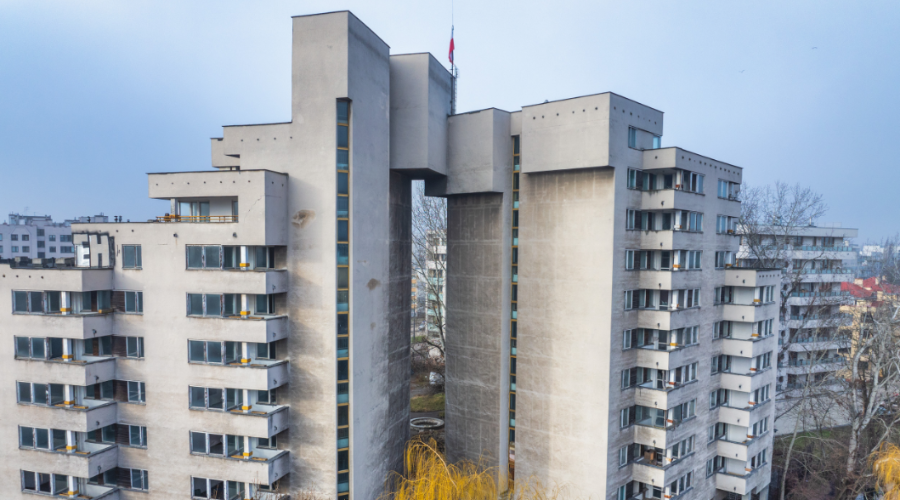Keep our news free from ads and paywalls by making a donation to support our work!

Notes from Poland is run by a small editorial team and is published by an independent, non-profit foundation that is funded through donations from our readers. We cannot do what we do without your support.
Warsaw city authorities have announced that they will renovate a former Russian diplomatic compound and turn parts of it into housing for “representatives of those professions that are particularly important for the functioning of the city”.
The complex, which was built by the Soviets in the 1970s, later became known by locals as “Spyville” (Szpiegowo) amid claims it was still used by Russian intelligence after 1989.
Polish authorities seized the complex in April 2022 after Russia’s full-scale invasion of Ukraine and hoped to then hand it over to the Ukrainian community. But the idea proved unfeasible due to the poor condition of the building.
Mamy przełom w sprawie "Szpiegowa".
Kompleks budynków przejętych z rąk rosyjskich dziś oficjalnie przejmuje @warszawa. Teraz możemy rozpocząć prace nad modernizacją budynków i przygotować mieszkania, które powiększą zasób miejskich lokali. Będziemy mogli je przekazać do użytku… pic.twitter.com/PeTlGj68R6
— Rafał Trzaskowski (@trzaskowski_) January 20, 2025
“I am very pleased that instead of a criminal regime, this building will finally be able to serve the citizens of Warsaw, because it is, in a sense, a symbol,” Warsaw mayor and presidential candidate Rafał Trzaskowski said at a press conference in front of the complex located at 100 Sobieskiego Street.
Trzaskowski, together with Mariusz Frankowski, governor of the Masovia province, announced that Warsaw has now officially taken over the ownership rights to the compound after the Polish state treasury donated it to the city.
In return, Warsaw agreed to donate 40 of its flats in the city to be rented out to employees of the police, in the hope of attracting more people to join the police force. In the long run, the premises of Spyville will be renovated and turned into apartments for public servants.
After the property was seized in 2022, the city authorities found the brutalist building in poor condition. Every room had been stripped and left in ruins. According to the authorities, only one radiator was left after its Russian former inhabitants removed the electrical cables, pipes and elements of the interior.
Warsaw now estimates that the renovation will cost at least 100 million zloty (€23.5 million). It hopes to get funds from the National Development Bank (BGK), a state-owned bank which is responsible for, among other tasks, supporting housing initiatives.
Among other things, it will be necessary to restore all installations, connect all utilities, replace windows and doors, and thermo-modernise the building. The authorities also plan to construct a new building on the site. The structure is to be a maximum of six storeys high and will resemble Spyville in its design.
With a total area of up to 4,100 square metres, it is estimated that the new building will offer up to 70 apartments and non-commercial premises serving residents as well as up to 67 spaces in an underground car park.
An investigation has found that Warsaw buses have been refuelled by a company until recently Russian owned, with links to Gazprom, and on Poland’s sanctions list.
The mayor says he is "concerned" and has asked the interior ministry to clarify the issue https://t.co/Z9MHc5S7Br
— Notes from Poland 🇵🇱 (@notesfrompoland) January 14, 2025
In the 1980s, Spyville was a gated estate in Warsaw with its own cinema, library and hair salon. The complex was often referred to as a “city within a city”.
After Poland left the Soviet bloc, Russia continued to claim ownership of the site, citing international agreements providing for the use of the building for diplomatic purposes.
However, the city authorities argued that the building had not been used as a diplomatic facility for a long time. In 2016, Warsaw district court ordered Russia to return the illegally occupied property and to pay more than 7 million zloty in outstanding debt plus interest.
In the absence of willingness from Russia to fulfil its obligation, Warsaw’s mayor filed in 2022 a motion for bailiff enforcement. The city has now become the site’s official owner.
Last year, Warsaw also took ownership of a former school for Russian children on Kielecka Street. Despite initial hopes to quickly re-open the facility, the building also turned out to be in unusable condition.

Notes from Poland is run by a small editorial team and published by an independent, non-profit foundation that is funded through donations from our readers. We cannot do what we do without your support.
Main image credit: Cezary Warś/Urząd m.st. Warszawy

Agata Pyka is a former assistant editor at Notes from Poland. She specialises in Central and Eastern European affairs, cybersecurity, and investigative reporting. She holds a master’s degree in political communication from the University of Amsterdam, and her work has appeared in Euractiv, the Balkan Investigative Reporting Network (BIRN), and The European Correspondent, among others.



















